- Home
- Anthony Trollope
Phineas Finn, the Irish Member Page 6
Phineas Finn, the Irish Member Read online
Page 6
‘Not if I know it,’ said Phineas, proudly. ‘Let me assure you I wouldn't change my views in politics either for you or for the Earl, though each of you carried seats in your breeches pockets. If I go into Parliament, I shall go there as a sound Liberal, – not to support a party, but to do the best I can for the country. I tell you so, and I shall tell the Earl the same.’
Barrington Erle turned away in disgust. Such language was to him simply disgusting. It fell upon his ears as false maudlin sentiment falls on the ears of the ordinary honest man of the world. Barrington Erle was a man ordinarily honest. He would not have been untrue to his mother's brother, William Mildmay, the great Whig Minister of the day, for any earthly consideration. He was ready to work with wages or without wages. He was really zealous in the cause, not asking very much for himself. He had some undefined belief that it was much better for the country that Mr Mildmay should be in power than that Lord de Terrier should be there. He was convinced that Liberal politics were good for Englishmen, and that Liberal politics and the Mildmay party were one and the same thing. It would be unfair to Barrington Erle to deny to him some praise for patriotism. But he hated the very name of independence in Parliament, and when he was told of any man, that that man intended to look to measures and not to men, he regarded that man as being both unstable as water and dishonest as the wind. No good could possibly come from such a one, and much evil might and probably would come. Such a politician was a Greek to Barrington Erle, from whose hands he feared to accept even the gift of a vote. Parliamentary hermits were distasteful to him, and dwellers in political caves5 were regarded by him with aversion as being either knavish or impractical. With a good Conservative opponent he could shake hands almost as readily as with a good Whig ally; but the man who was neither flesh nor fowl was odious to him. According to his theory of parliamentary government, the House of Commons should be divided by a marked line, and every member should be required to stand on one side of it or on the other. ‘If not with me, at any rate be against me,’ he would have said to every representative of the people in the name of the great leader whom he followed. He thought that debates were good, because of the people outside, – because they served to create that public opinion which was hereafter to be used in creating some future House of Commons; but he did not think it possible that any vote should be given on a great question, either this way or that, as the result of a debate; and he was certainly assured in his own opinion that any such changing of votes would be dangerous, revolutionary, and almost unparliamentary. A member's vote, – except on some small crotchety open question thrown out for the amusement of crotchety members, – was due to the leader of that member's party. Such was Mr Erle's idea of the English system of Parliament, and, lending semi-official assistance as he did frequently to the introduction of candidates into the House, he was naturally anxious that his candidates should be candidates after his own heart. When, therefore, Phineas Finn talked of measures and not men, Barrington Erle turned away in open disgust. But he remembered the youth and extreme rawness of the lad, and he remembered also the careers of other men.
Barrington Erle was forty, and experience had taught him something. After a few seconds, he brought himself to think mildly of the young man's vanity, – as of the vanity of a plunging colt who resents the liberty even of a touch. ‘By the end of the first session the thong will be cracked over his head, as he patiently assists in pulling the coach up hill, without producing from him even a flick of his tail,’ said Barrington Erle to an old parliamentary friend.
‘If he were to come out after all on the wrong side,’ said the parliamentary friend.
Erle admitted that such a trick as that would be unpleasant, but he thought that old Lord Tulla was hardly equal to so clever a stratagem.
Phineas went to Ireland, and walked over the course at Loughshane. He called upon Lord Tulla, and heard that venerable nobleman talk a great deal of nonsense. To tell the truth of Phineas, I must confess that he wished to talk the nonsense himself; but the Earl would not hear him, and put him down very quickly. ‘We won't discuss politics, if you please, Mr Finn; because, as I have already said, I am throwing aside all political considerations.’ Phineas, therefore, was not allowed to express his views on the government of the country in the Earl's sitting-room at Castlemorris. There was, however, a good time coming; and so, for the present, he allowed the Earl to ramble on about the sins of his brother George, and the want of all proper pedigree on the part of the new Dean of Kilfenora. The conference ended with an assurance on the part of Lord Tulla that if the Loughshaners chose to elect Mr Phineas Finn he would not be in the least offended. The electors did elect Mr Phineas Finn, – perhaps for the reason given by one of the Dublin Conservative papers, which declared that it was all the fault of the Carlton Club in not sending a proper candidate. There was a great deal said about the matter, both in London and Dublin, and the blame was supposed to fall on the joint shoulders of George Morris and his elder brother. In the meantime, our hero, Phineas Finn, had been duly elected member of Parliament for the borough of Loughshane.
The Finn family could not restrain their triumphings at Killaloe, and I do not know that it would have been natural had they done so. A gosling from such a flock does become something of a real swan by getting into Parliament. The doctor had his misgivings, – had great misgivings, fearful forebodings; but there was the young man elected, and he could not help it. He could not refuse his right hand to his son or withdraw his paternal assistance because that son had been specially honoured among the young men of his country. So he pulled out of his hoard what sufficed to pay off outstanding debts, – they were not heavy, – and undertook to allow Phineas two hundred and fifty pounds a year as long as the session should last.
There was a widow lady living at Killaloe who was named Mrs Flood Jones, and she had a daughter. She had a son also, born to inherit the property of the late Floscabel Flood Jones, of Floodborough, as soon as that property should have disembarrassed itself; but with him, now serving with his regiment in India, we shall have no concern. Mrs Flood Jones was living modestly at Killaloe, on her widow's jointure, – Floodborough having, to tell the truth, pretty nearly fallen into absolute ruin, – and with her lived her one daughter, Mary. Now, on the evening before the return of Phineas Finn, Esq., M.P., to London, Mrs and Miss Flood Jones drank tea at the doctor's house. ‘It won't make a bit of change in him,’ Barbara Finn said to her friend Mary, up in some bedroom privacy before the tea-drinking ceremonies had altogether commenced.
‘Oh, it must,’ said Mary.
‘I tell you it won't, my dear; he is so good and so true.’
‘I know he is good, Barbara; and as for truth, there is no question about it, because he has never said a word to me that he might not say to any girl.’
‘That's nonsense, Mary.’
‘He never has, then, as sure as the blessed Virgin watches over us; – only you don't believe she does.’
‘Never mind about the Virgin now, Mary.’
‘But he never has. Your brother is nothing to me, Barbara.’
‘Then I hope he will be before the evening is over. He was walking with you all yesterday and the day before.’
‘Why shouldn't he, – and we that have known each other all our lives? But, Barbara, pray, pray never say a word of this to any one!’
‘Is it I? Wouldn't I cut out my tongue first?’
‘I don't know why I let you talk to me in this way. There has never been anything between me and Phineas, – your brother I mean.’
‘I know whom you mean very well.’
‘And I feel quite sure that there never will be. Why should there? He'll go out among great people and be a great man; and I've already found out that there's a certain Lady Laura Standish whom he admires very much.’
‘Lady Laura Fiddlestick!’
‘A man in Parliament, you know, may look up to anybody,’ said Miss Mary Flood Jones.
‘I want Phin to look up
to you, my dear.’
‘That wouldn't be looking up . Placed as he is now, that would be looking down; and he is so proud that he'll never do that. But come down, dear, else they'll wonder where we are.’
Mary Flood Jones was a little girl about twenty years of age, with the softest hair in the world, of a colour varying between brown and auburn, – for sometimes you would swear it was the one and sometimes the other; and she was as pretty as ever she could be. She was one of those girls, so common in Ireland, whom men, with tastes that way given, feel inclined to take up and devour on the spur of the moment; and when she liked her lion, she had a look about her which seemed to ask to be devoured. There are girls so cold-looking, – pretty girls, too, ladylike, discreet, and armed with all accomplishments, – whom to attack seems to require the same sort of courage, and the same sort of preparation, as a journey in quest of the north-west passage. One thinks of a pedestal near the Athenaeum as the most appropriate and most honourable reward of such courage. But, again, there are other girls to abstain from attacking whom is, to a man of any warmth of temperament, quite impossible. They are like water when one is athirst, like plovers’ eggs in March, like cigars when one is out in the autumn. No one ever dreams of denying himself when such temptation comes in the way. It often happens, however, that in spite of appearances, the water will not come from the well, nor the egg from its shell, nor will the cigar allow itself to be lit. A girl of such appearance, so charming, was Mary Flood Jones of Killaloe, and our hero Phineas was not allowed to thirst in vain for a drop from the cool spring.
When the girls went down into the drawing-room Mary was careful to go to a part of the room quite remote from Phineas, so as to seat herself between Mrs Finn and Dr Finn's young partner, Mr Elias Bodkin, from Ballinasloe. But Mrs Finn and the Miss Finns and all Killaloe knew that Mary had no love for Mr Bodkin, and when Mr Bodkin handed her the hot cakes she hardly so much as smiled at him. But in two minutes Phineas was behind her chair, and then she smiled; and in five minutes more she had got herself so twisted round that she was sitting in a corner with Phineas and his sister Barbara; and in two more minutes Barbara had returned to Mr Elias Bodkin, so that Phineas and Mary were uninterrupted. They manage these things very quickly and very cleverly in Killaloe.
‘I shall be off to-morrow morning by the early train,’ said Phineas.
‘So soon; – and when will you have to begin, – in Parliament, I mean?’
‘I shall have to take my seat on Friday. I'm going back just in time.’
‘But when shall we hear of your saying something?’
‘Never probably. Not one in ten who go into Parliament ever do say anything.’
‘But you will; won't you? I hope you will. I do so hope you will distinguish yourself; – because of your sister, and for the sake of the town, you know.’
‘And is that all, Mary?’
‘Isn't that enough?’
‘You don't care a bit about myself, then?’
‘You know that I do. Haven't we been friends ever since we were children? Of course it will be a great pride to me that a person whom I have known so intimately should come to be talked about as a great man.’
‘I shall never be talked about as a great man.’
‘You're a great man to me already, being in Parliament. Only think; – I never saw a member of Parliament in my life before.’
‘You've seen the bishop scores of times.’
‘Is he in Parliament? Ah, but not like you. He couldn't come to be a Cabinet Minister, and one never reads anything about him in the newspapers. I shall expect to see your name very often, and I shall always look for it. “Mr Phineas Finn paired off with Mr Mildmay.” What is the meaning of pairing off?’
‘I'll explain it all to you when I come back, after learning my lesson.’
‘Mind you do come back. But I don't suppose you ever will. You will be going somewhere to see Lady Laura Standish when you are not wanted in Parliament.’
‘Lady Laura Standish!’
‘And why shouldn't you? Of course, with your prospects, you should go as much as possible among people of that sort. Is Lady Laura very pretty?’
‘She's about six feet high.’
‘Nonsense. I don't believe that.’
‘She would look as though she were, standing by you.’
‘Because I am so insignificant and small.’
‘Because your figure is perfect, and because she is straggling. She is as unlike you as possible in everything. She has thick lumpy red hair, while yours is all silk and softness. She has large hands and feet, and –’
‘Why, Phineas, you are making her out to be an ogress, and yet I know that you admire her.’
‘So I do, because she possesses such an appearance of power. And after all, in spite of the lumpy hair,6 and in spite of large hands and straggling figure, she is handsome. One can't tell what it is. One can see that she is quite contented with herself, and intends to make others contented with her. And so she does.’
‘I see you are in love with her, Phineas.’
‘No; not in love, – not with her at least. Of all men in the world, I suppose that I am the last that has a right to be in love. I daresay I shall marry some day.’
‘I'm sure I hope you will.’
‘But not till I'm forty or perhaps fifty years old. If I was not fool enough to have what men call a high ambition I might venture to be in love now.’
‘I'm sure I'm very glad that you've got a high ambition. It is what every man ought to have; and I've no doubt that we shall hear of your marriage soon, – very soon. And then, – if she can help you in your ambition, we – shall – all – be so – glad.’
Phineas did not say a word further then. Perhaps some commotion among the party broke up the little private conversation in the corner. And he was not alone with Mary again till there came a moment for him to put her cloak over her shoulders in the back parlour, while Mrs Flood Jones was finishing some important narrative to his mother. It was Barbara, I think, who stood in some doorway, and prevented people from passing, and so gave him the opportunity which he abused.
‘Mary,’ said he, taking her in his arms, without a single word of love-making beyond what the reader has heard, – ‘one kiss before we part.’
‘No, Phineas, no!’ But the kiss had been taken and given before she had even answered him. ‘Oh, Phineas, you shouldn't!’
‘I should. Why shouldn't I? And, Mary, I will have one morsel of your hair.’
‘You shall not; indeed, you shall not!’ But the scissors were at hand, and the ringlet was cut and in his pocket before she was ready with her resistance. There was nothing further; – not a word more, and Mary went away with her veil down, under her mother's wing, weeping sweet silent tears which no one saw.
‘You do love her; don't you, Phineas?’ asked Barbara.
‘Bother! Do you go to bed, and don't trouble yourself about such trifles. But mind you're up, old girl, to see me off in the morning.’
Everybody was up to see him off in the morning, to give him coffee and good advice, and kisses, and to throw all manner of old shoes after him as he started on his great expedition to Parliament. His father gave him an extra twenty-pound note, and begged him for God's sake to be careful about his money. His mother told him always to have an orange in his pocket when he intended to speak longer than usual. And Barbara in a last whisper begged him never to forget dear Mary Flood Jones.
CHAPTER 3
Phineas Finn Takes his Seat
PHINEAS had many serious, almost solemn thoughts on his journey towards London. I am sorry I must assure my female readers that very few of them had reference to Mary Flood Jones. He had, however, very carefully packed up the tress, and could bring that out for proper acts of erotic worship at seasons in which his mind might be less engaged with affairs of state than it was at present. Would he make a failure of this great matter which he had taken in hand? He could not but tell himself that the chances we
re twenty to one against him. Now, that he looked nearer at it all, the difficulties loomed larger than ever, and the rewards seemed to be less, more difficult of approach, and more evanescent. How many members were there who could never get a hearing! How many who only spoke to fail! How many, who spoke well, who could speak to no effect as far as their own worldly prospects were concerned! He had already known many members of Parliament to whom no outward respect or sign of honour was ever given by any one; and it seemed to him, as he thought over it, that Irish members of Parliament were generally treated with more indifference than any others. There were O'B— and O'C— and O'D—, for whom no one cared a straw, who could hardly get men to dine with them at the club, and yet they were genuine members of Parliament. Why should he ever be better than O'B—, or O'C—, or O'D—? And in what way should he begin to be better? He had an idea of the fashion after which it would be his duty to strive that he might excel those gentlemen. He did not give any of them credit for much earnestness in their country's behalf, and he was minded to be very earnest. He would go to his work honestly and conscientiously, determined to do his duty as best he might, let the results to himself be what they would. This was a noble resolution, and might have been pleasant to him, – had he not remembered that smile of derision which had come over his friend Erle's face when he declared his intention of doing his duty to his country as a Liberal, and not of supporting a party. O'B— and O'C— and O'D— were keen enough to support their party, only they were sometimes a little astray at knowing which was their party for the nonce. He knew that Erle and such men would despise him if he did not fall into the regular groove, – and if the Barrington Erles despised him, what would then be left for him?
His moody thoughts were somewhat dissipated when he found one Laurence Fitzgibbon, – the Honourable Laurence Fitzgibbon, – a special friend of his own, and a very clever fellow, on board the boat as it steamed out of Kingston harbour. Laurence Fitzgibbon had also just been over about his election, and had been returned as a matter of course for his father's county. Laurence Fitzgibbon had sat in the House for the last fifteen years, and was yet wellnigh as young a man as any in it. And he was a man altogether different from the O'B—s, O'C—s, and O'D—s. Laurence Fitzgibbon could always get the ear of the House if he chose to speak, and his friends declared that he might have been high up in office long since if he would have taken the trouble to work. He was a welcome guest at the houses of the very best people, and was a friend of whom any one might be proud. It had for two years been a feather in the cap of Phineas that he knew Laurence Fitzgibbon. And yet people said that Laurence Fitzgibbon had nothing of his own, and men wondered how he lived. He was the youngest son of Lord Claddagh, an Irish peer with a large family, who could do nothing for Laurence, his favourite child, beyond finding him a seat in Parliament.

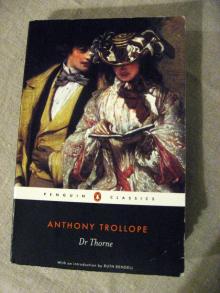 Doctor Thorne
Doctor Thorne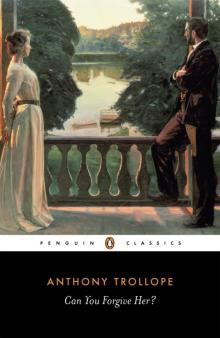 Can You Forgive Her?
Can You Forgive Her?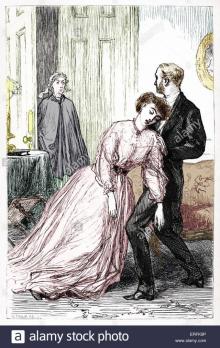 The Last Chronicle of Barset
The Last Chronicle of Barset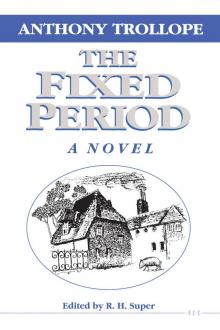 The Fixed Period
The Fixed Period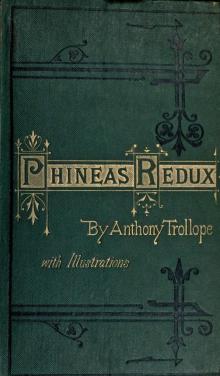 Phineas Redux
Phineas Redux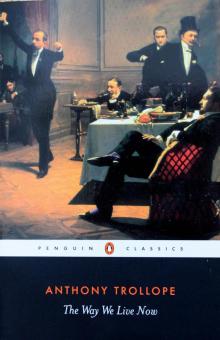 The Way We Live Now
The Way We Live Now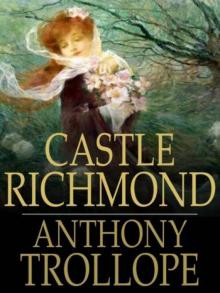 Castle Richmond
Castle Richmond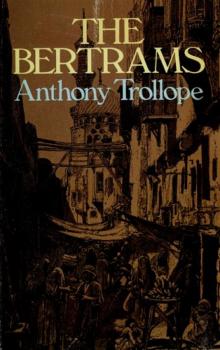 The Bertrams
The Bertrams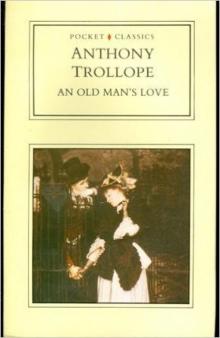 An Old Man's Love
An Old Man's Love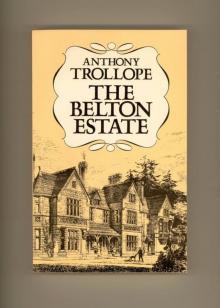 The Belton Estate
The Belton Estate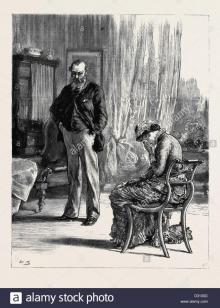 Marion Fay: A Novel
Marion Fay: A Novel The Claverings
The Claverings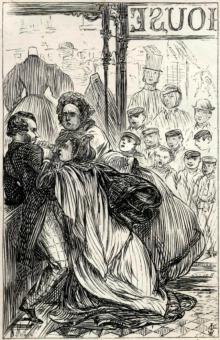 The Struggles of Brown, Jones, and Robinson
The Struggles of Brown, Jones, and Robinson Nina Balatka
Nina Balatka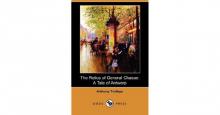 The Relics of General Chasse: A Tale of Antwerp
The Relics of General Chasse: A Tale of Antwerp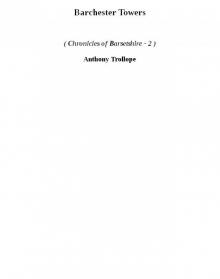 Barchester Towers cob-2
Barchester Towers cob-2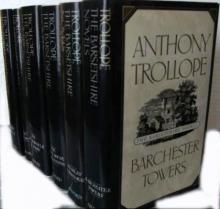 The Chronicles of Barsetshire
The Chronicles of Barsetshire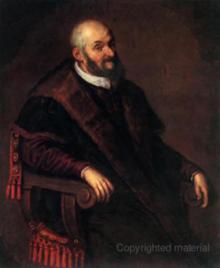 The Warden cob-1
The Warden cob-1 Framley Parsonage
Framley Parsonage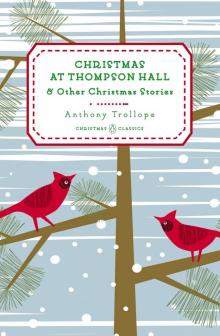 Christmas at Thompson Hall
Christmas at Thompson Hall The Warden
The Warden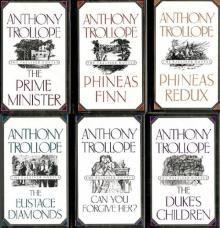 The Palliser Novels
The Palliser Novels The Small House at Allington
The Small House at Allington Barchester Towers
Barchester Towers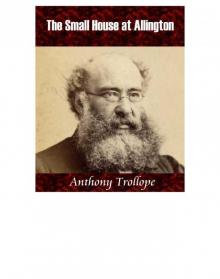 The Small House at Allington cob-5
The Small House at Allington cob-5 The Duke's Children
The Duke's Children Phineas Finn, the Irish Member
Phineas Finn, the Irish Member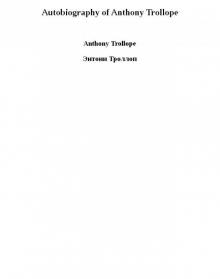 Autobiography of Anthony Trollope
Autobiography of Anthony Trollope